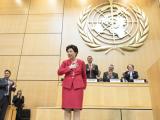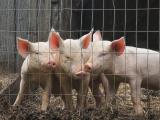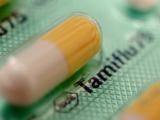GSK vaccine sales lower than predicted
Flu-vaccine manufacturer GlaxoSmithKline (GSK) could end up earning only 75% of what it once forecast from H1N1 vaccines, as governments renegotiate their contracts to two thirds of what they ordered last year, the Financial Times reported. Similar results are expected for other flu-shot manufacturers. In a separate statement, GSK acknowledged that countries are changing their orders but said it is "too early to say" what final dose totals and earnings for H1N1 vaccine will be.
http://www.ft.com/cms/s/0/ced13c7c-0372-11df-a601-00144feabdc0.html
Jan 17 Financial Times report
FDA chief stresses safety of H1N1 vaccine
Margaret Hamburg, MD, commissioner of the US Food and Drug Administration (FDA) recently sent a letter to healthcare professionals reassuring them about the safety of the pandemic H1N1 vaccine, based on the latest findings. She said no substantial differences between the pandemic and seasonal flu vaccine have been seen and that 94% of adverse events have been nonserious conditions such as injection-site soreness.
http://www.fda.gov/NewsEvents/PublicHealthFocus/ucm197733.htm
Jan 14 FDA letter
Greece, Norway scale back vaccine orders
Greece and Norway have both cut back on pandemic vaccine deliveries, Agence France-Presse (AFP) reported. The Greek health ministry said it would pay for only the 3.6 million doses it has already received and wants companies to refund advances made for future shipments. Meanwhile, Norway's health ministry said it reached an agreement with GSK to trim its order by 30%. It has received about 4.3 million doses so far and has vaccinated about 60% of its population.
http://health.yahoo.com/news/afp/healthfluvaccinenorwaygreece_20100118195100.html
Jan 18 AFP story
Experts review Australia's pandemic response
Two respiratory medicine experts from Australia, in a recent issue of Respirology, critiqued their country's H1N1 pandemic response. One said officials could have done more to slow the spread of the virus, such as isolating infected cruise ship passengers and canceling youth sports events, as well as better coordinating response across government levels. The other author praised officials for funding research efforts, but said the next possible wave may reveal more about response.
http://www3.interscience.wiley.com/cgi-bin/fulltext/123226687/HTMLSTART
Jan Respirology report
Massachusetts minorities hit harder than whites
Massachusetts is the latest jurisdiction to find higher rates of flu illness and death in its non-white residents, the Boston Globe reported in its blog White Coat Notes. Asians were hospitalized 1.5 times as often as whites and were 4 times as likely to die from flu; Hispanics were hospitalized 3 times as often and were 6 times as likely to die; and blacks were hospitalized more than 4 times as often, and had death rates more than 3 times higher than whites.
http://www.boston.com/news/health/blog/2010/01/swine_flu_hit_m.html
Jan 15 Boston Globe blog post
County tests emergency response with H1N1 shots
Lexington County, S.C., used a newly arrived allotment of H1N1 vaccine to stage a 1-day test of its emergency medical response, The State newspaper reported. The county used a sports field to set up portable hospital tents purchased with homeland security funds, called in health professionals and community volunteers to work the site, and funneled 600 vaccine recipients through at several minutes each.
http://www.thestate.com/local/story/1114204.html
Jan 17 The State story
Los Angeles airport makes vaccine available
The Los Angeles international airport recently began offering flu shots, including the pandemic vaccine, in most of its terminals. A spokewoman said the airport's goal is to help curb flu spread and put the shots within convenient reach of travelers. Vaccination stations are staffed by nurses from FluEase, a company that specializes in immunization services for organizations. The shots cost $30, and vaccination will continue throughout flu season.
http://www.lawa.org/newsContent.aspx?ID=1244
Jan 11 LAX press release


















